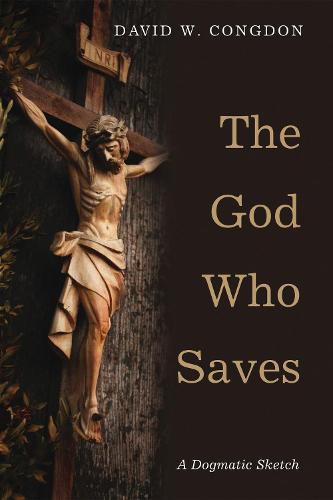Readings Newsletter
Become a Readings Member to make your shopping experience even easier.
Sign in or sign up for free!
You’re not far away from qualifying for FREE standard shipping within Australia
You’ve qualified for FREE standard shipping within Australia
The cart is loading…






This title is printed to order. This book may have been self-published. If so, we cannot guarantee the quality of the content. In the main most books will have gone through the editing process however some may not. We therefore suggest that you be aware of this before ordering this book. If in doubt check either the author or publisher’s details as we are unable to accept any returns unless they are faulty. Please contact us if you have any questions.
Christian universalism has been explored in its biblical, philosophical, and historical dimensions. For the first time, The God Who Saves explores it in systematic theological perspective. In doing so it also offers a fresh take on universal salvation, one that is postmetaphysical, existential, and hermeneutically critical. The result is a constructive account of soteriology that does justice to both the universal scope of divine grace and the historicity of human existence. In The God Who Saves David W. Congdon orients theology systematically around the New Testament witness to the apocalyptic inbreaking of God’s reign. The result is a consistently soteriocentric theology. Building on the insights of Rudolf Bultmann, Ernst Kasemann, Eberhard Jungel, and J. Louis Martyn, he interprets the saving act of God as the eschatological event that crucifies the old cosmos in Christ. Human beings participate in salvation through their unconscious, existential cocrucifixion, in which each person is interrupted by God and placed outside of himself or herself. Both academically rigorous and pastorally sensitive, The God Who Saves opens up new possibilities for understanding not only what salvation is but also who the God who brings about our salvation is. Here is an interdisciplinary exercise in dogmatic theology for the twenty-first century.
$9.00 standard shipping within Australia
FREE standard shipping within Australia for orders over $100.00
Express & International shipping calculated at checkout
This title is printed to order. This book may have been self-published. If so, we cannot guarantee the quality of the content. In the main most books will have gone through the editing process however some may not. We therefore suggest that you be aware of this before ordering this book. If in doubt check either the author or publisher’s details as we are unable to accept any returns unless they are faulty. Please contact us if you have any questions.
Christian universalism has been explored in its biblical, philosophical, and historical dimensions. For the first time, The God Who Saves explores it in systematic theological perspective. In doing so it also offers a fresh take on universal salvation, one that is postmetaphysical, existential, and hermeneutically critical. The result is a constructive account of soteriology that does justice to both the universal scope of divine grace and the historicity of human existence. In The God Who Saves David W. Congdon orients theology systematically around the New Testament witness to the apocalyptic inbreaking of God’s reign. The result is a consistently soteriocentric theology. Building on the insights of Rudolf Bultmann, Ernst Kasemann, Eberhard Jungel, and J. Louis Martyn, he interprets the saving act of God as the eschatological event that crucifies the old cosmos in Christ. Human beings participate in salvation through their unconscious, existential cocrucifixion, in which each person is interrupted by God and placed outside of himself or herself. Both academically rigorous and pastorally sensitive, The God Who Saves opens up new possibilities for understanding not only what salvation is but also who the God who brings about our salvation is. Here is an interdisciplinary exercise in dogmatic theology for the twenty-first century.